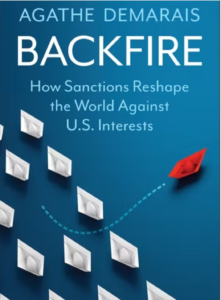 Bola Tinubu, a wealthy kleptocratic “godfather” of politics who campaigned on the slogan “It’s my turn”, has been declared the winner of Nigeria’s disputed presidential election, The [London] Times reports.
Bola Tinubu, a wealthy kleptocratic “godfather” of politics who campaigned on the slogan “It’s my turn”, has been declared the winner of Nigeria’s disputed presidential election, The [London] Times reports.
With yet another kleptocrat ensconced in power, what leverage is available to democratic actors concerned to curb their corrupt influence?
Sanctions are a bad idea in principle and not very effective in practice, but they may still be the least worst option. That’s the key message Agathe Demarais makes clear in her excellent, insightful and rather sobering book Backfire: How Sanctions Reshape the World Against US Interests, notesadjunct professor at the University of Technology Sydney.
Perhaps so, but it’s worth asking what other options are available to policymakers, short of direct coercion and military might. If nothing else, sanctions are cheaper to apply and don’t risk cataclysmic conflicts when they fail, he writes for The Conversation:
Part of the problem here, of course, has been the willingness of people and even other governments to facilitate the avoidance schemes of bad actors. Britain’s role in assisting Russia’s kleptocracy to manage its wealth is perhaps the most egregious case in point.
 Canada’s 2017 Magnitsky Law was a game-changer, according to Brandon Silver, Irwin Cotler and Bill Browder (right). It broadened the implementing threshold for autonomous sanctions from “a grave breach of international peace and security… that has resulted in or is likely to result in a serious international crisis” to also include “gross and systematic human rights violations” and “acts of corruption.”
Canada’s 2017 Magnitsky Law was a game-changer, according to Brandon Silver, Irwin Cotler and Bill Browder (right). It broadened the implementing threshold for autonomous sanctions from “a grave breach of international peace and security… that has resulted in or is likely to result in a serious international crisis” to also include “gross and systematic human rights violations” and “acts of corruption.”
Drawing on Silver’s recent testimony to the Canadian Senate Foreign Affairs Committee, they assert that Canada’s global leadership on sanctions exceeds other larger economies and G7 states, and outline further opportunities to collaborate more closely with likeminded states and civil society. There are at least ten ways Magnitsky can be improved, equally applicable to other jurisdictions, they write for Policy magazine.
In response to Western sanctions on oligarchs and the seizure of assets after Russia’s 2022 invasion of Ukraine, kleptocrats are adapting, increasingly turning to new jurisdictions to park their illicit wealth, working together across countries to evade sanctions, and targeting journalists and activists in new ways. As authoritarian actors adapt to the changing landscape, democracies must also adapt and treat the fight against kleptocracy as a pressing national security concern.
 Kleptocratic Adaptation: Scaling the Democratic Response
Kleptocratic Adaptation: Scaling the Democratic Response
Join RUSI’s Centre for Financial Crime and Security Studies and the International Forum for Democratic Studies for a discussion of a new report by authors Jodi Vittori and Matthew Page.
Panelists:
- Jodi Vittori, Professor of Practice and Co-chair of the Global Politics and Security Programme, Georgetown University Walsh School of Foreign Service; RUSI Associate Fellow
- Matthew Page, Non-resident Scholar, Carnegie Endowment for International Peace
- Helena Wood, Senior Research Fellow, Centre for Financial Crime and Security Studies, RUSI
Moderator: Melissa Aten, Senior Program Officer, National Endowment for Democracy (NED).
– (GMT) 1 Birdcage Walk , London, SW1H 9JJ / Online. RSVP
Read the report: Kleptocratic Adaptation: Next Steps in the Battle Against Kleptocracy







